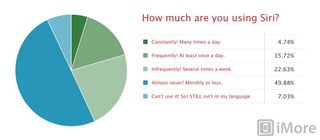Siri six months later: Community report card

Siri, the iPhone 4S' flagship feature has been on the market now for 6 months. On one hand, Siri is absolutely amazing -- the first real virtual personal assistant with a personality right out of Pixar. On the other hand, Siri is obviously still in beta and often fails or works just enough to frustrate more than any outright failure. That makes it an odd choice for a flagship feature, but given the lack of a physical redesign and the obvious potential for awesome demos, rightly or wrongly, Siri was what Apple had to work with.
But does it work for us?
Survey says: Siri usage is low

iMore is an iPhone enthusiast site, so our community is predisposed to adopt new features quickly and use them extensively. Yet Siri usage among the iMore nation remains curiously low. As of today, with over 4000 votes cast, nearly 50% of our readers seldom, if ever, use Siri.
That's... astonishing. Here's the full break down:
- Almost 5% use Siri often, many times a day.
- Over 15% use Siri frequently, on a daily basis.
- Roughly 23% use Siri infrequently, at least several times a week
- Nearly 50% almost never use Siri, monthly or less.
- Just over 7% might use Siri, but it's not yet available in their native language.
Taken together, only 20% of our iPhone 4S users are using Siri on anything approaching a regular basis. That leaves 80% using it irregularly at best, and 50% barely using it at all.
This in spite of Apple showcasing Siri during the iPhone 4S introduction, putting it front and center on Apple.com, and making Siri the focus of most of the iPhone 4S advertising. They gave it the iPhone event keynote. They gave it Santa. They gave it Samuel L. Jackson.
And still few of our readers are using it.
Master your iPhone in minutes
iMore offers spot-on advice and guidance from our team of experts, with decades of Apple device experience to lean on. Learn more with iMore!
That's not unprecedented, of course. The 2010 iPhone 4 launch saw a lot of attention placed on Apple's video calling service, FaceTime. But it's still interesting.
Siri community commentary: six months later

So why are -- or mostly aren't -- you using Siri six months after it was introduced? Here's what you've told us:
I prefer dictation to Siri most of the time. Use Siri not quite everyday, but I think several times a week is still pretty often. Now my 5 year old thinks Siri is great, talks to her several times a minute when i let her.
- Cody Hahn
Some of you in the US who think its bad should try Siri in the UK. It’s virtually useless. I’d love to ask Siri to locate the nearest pub or something, but we can’t even do that. Yes I know it’s in BETA, but I really had hopes they’d be releasing updates more frequently when I purchased my 4S to be perfectly honest.
- Chris Flowers
It’s always down, or something else is wrong. Or it just hangs when I tell her to call someone. Kind of giving up on it. Needs a few more years of seasoning.
- Dave D
I’ve stopped differentiating between Siri and voice dictation, as I believe it is largely the same animal. Siri interaction is a bit more problematic, so I often leave Siri alone and then dictate directly within a given app. For appointments and reminders, I ONLY want to use Siri. I almost won’t set the calendar/reminder item until Siri is no longer “sorry.” So, I use it a good once a day, at least, if you consider the above under the same umbrella.
- West
I use Siri daily.. with 90% success rate. I use it for meetings, reminders, appointments, looking stuff up, texting and calling. So easy to say call Wife at work and it is done.
Siri NEVER works for me. I'm always in full signal 3G or Wifi at work and home and it takes her at least 30 - 60 seconds and I get to frustrated and turn it off. I am not a fan.
I use Siri all the time. Reading, writing texts. Setting up reminders, making and editing notes, getting directions (navacon), toggling Bluetooth, wifi, flashlight etc... I'd be lost if I couldn't talk to my phone.
I use Siri for reminders. The few times I've tried using it to send a text while driving I've gotten so frustrated I could have just as easily been texting. The whole idea is to to not take your mind off the road.
I still use Siri and it is very helpful. As I stated in another thread, I use if primarily to text & respond to text messages while driving, set reminders, look up information and to dial contacts for me. I have never asked it frivolous questions and it did not factor in to my reason for buying my iPhone 4S. Could it be better? Heck yeah. Do I depend on it? Absolutely not. I've had a smartphone or a PDA phone for so long and I'm so used to doing things manually that I forget about Siri sometimes.
I use Siri everyday and every time Siri comes up I can't help thinking 3 things: 1. Why didn't we have this 10 years ago? 2. Why isn't this better? (Can't launch apps or modify settings) 3. How do people still "type" messages, it feels so archaic to type in 2012. It's great for reminders and meetings. Sending texts, timers for cooking or whatever it is you are doing. Why type???? I just don't get it besides being in an environment where you it wouldn't be appropriate to speak.
Deciphering the disuse and discontent

For a few readers Siri has become important or even quasi indispensable. (Some of our editors have even joked Siri has made them so lazy that, if it's unavailable, they'll wait rather than actually type out a text message...) However, for many more readers, Siri simply wasn't part of their iPhone usage pattern. Based on the feedback we've gotten, it seems the disuse or discontent with Siri can be broken down into a few categories.
- Some people just forget Siri is there. Siri is something new and new things don't always enter into, or find a place in, established workflows.
- Siri not working -- either because it doesn't understand certain accents, because the required network connection fails, or because it simply takes too long to respond -- causes enough frustration that some users simply abandon it and don't go back. How many people would use Google if searches routinely took 30 seconds or more to return?
- The inconsistent implementation -- ability to read texts but not emails, ability to launch some apps for specific functions but not simply launch an app, etc. -- creates an unpredictable or incomplete enough usability model that many simply exclude it entirely.
- The lack of timely and consistent updates from Apple -- only one new language in 6 months and no new features or integration -- creates a wait and see attitude that, so far, is still waiting but not seeing.
- The amount and type of Siri advertising creates expectations that the actual service (point #2) and support to date (point #4) don't live up to, leading to dissatisfaction.
There's also another alternative -- Siri is a new kind of interface meant for a new kind of user. iPhone sales numbers indicate it's the first smartphone to capture a predominantly mainstream audience. That audience isn't familiar with how smartphones historically worked, and something like Siri might ultimately prove more accessibly and less intimidating than a traditional app-launcher style interface. All of the factors listed above absolutely hurt Siri's chances of achieving that right now, but Siri could still achieve that in a future where it's both more reliable and more functional.
If that's the case, our iPhone enthusiast audience may never be the target for Siri, but the mainstream audience that is its target isn't using it, or isn't enjoying the use of Siri just yet.
Siri next steps

So six months later and Siri usage among iMore readers is low. What can be done to change that? The opposite of what we conjecture is causing it.
- There's not much more Apple can do to boost Siri awareness, given that it's already the centerpiece of their iPhone 4S advertising, and making Siri popup like Microsoft Assistant would cause most of us to throw our phones at a wall. They can't just make people more aware of Siri, they have to make Siri more usable.
- Improve Siri's ability to understand accents in the U.K. Since Siri claims to support U.K. English, supporting U.K. English is something important to do. No doubt the beta period, where Siri is fed more and more voice data, will help with that. Network connection issues are tougher. There's absolutely no excuse for Siri's servers on Apple's data centers to go down or even be slow to respond. Apple is rich enough to support the best technology and ensure among the best up times and availability in the business. Carrier connection problems. especially notorious in the U.S., are beyond Apple's ability to address unless/until they can put some base level of Siri functionality locally, on-device, as a fallback.
- Adding more well-rounded features may be non-trivial but is necessary to create consistency in the Siri experience. If text entry or basic navigation was different, or non-existent, from app to app, it would make the iPhone unusable (see early versions of Android). Siri working differently, or not working at all, with some core apps makes it likewise difficult to count on. Adding the basics like Settings toggles, app launching, email reading, etc. would increase consistency and also solve general iOS pain points. ("Siri, turn Bluetooth off!" alone would likely bolster usage considerably.)
- Roll out incremental updates. The power of online services is that they can be updated on the server-side, which means they're less disruptive and can be more frequent than larger software patches. Updates create confidence. Japanese was a great addition in iOS 5.1, but it was the only addition in 6 months and that's a long time.
- Obviously Apple isn't going to stop advertising Siri unless and until they have something just as compelling to replace it with, and they're not going to make it tell Zooey Deschenel it can't connect to the network when she wants to get her dance on. That's the cost of marketing based on a beta feature that sets expectations the product can't meet. Apple doesn't often do it, but they've done it in this case and they're stuck with it now.
No doubt Apple is working away on Siri, and adding Spanish, Italian, Portuguese, Chinese, and other languages is certainly non-trivial. Nothing about voice and context parsing is easy. Yet positioned the way it is, as the flagship feature of the iPhone 4S, Siri legitimately brings equal and opposite expectations down on Apple.
Conclusion
Six months later and a lot of you simply aren't using Siri. If you're one of them, let us know what Apple could do to get you on board. If you are using Siri, why do you think so many others aren't? The first developer betas for iOS 6 may be just around the corner, and the next generation iPhone 5,1 may just be on track for a fall release. What does Apple have to do to turn the corner on Siri and make it as mainstream and popular a feature as the iPhone itself?
Georgia contributed portions of this article
Image credit: iDoodle by Jason Harrison

Rene Ritchie is one of the most respected Apple analysts in the business, reaching a combined audience of over 40 million readers a month. His YouTube channel, Vector, has over 90 thousand subscribers and 14 million views and his podcasts, including Debug, have been downloaded over 20 million times. He also regularly co-hosts MacBreak Weekly for the TWiT network and co-hosted CES Live! and Talk Mobile. Based in Montreal, Rene is a former director of product marketing, web developer, and graphic designer. He's authored several books and appeared on numerous television and radio segments to discuss Apple and the technology industry. When not working, he likes to cook, grapple, and spend time with his friends and family.
Most Popular





